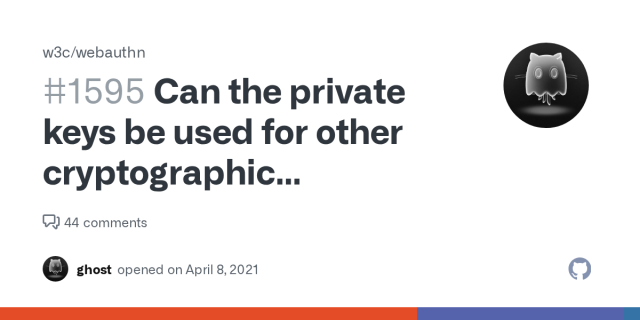It’s very interesting reading this and related threads on Web Authentication (“passkeys”).
The ability for people to use their created/associated key material to sign and encrypt their communication would be a huge boon for decentralised web applications. And yet, of course, the related W3C groups reject the use case. Because allowing people (instead of the corporations the W3C represents) to control their own identities is anathema to Big Tech.
github.com/w3c/webauthn/issues…

Can the private keys be used for other cryptographic operations? · Issue #1595 · w3c/webauthn
For example, can they be used to sign and encrypt data the client passes? This goes beyond authentication, so it may be fair to consider it out of scope, given that "authn" is in the spec...GitHub
Aral Balkan
in reply to Aral Balkan • • •Your daily reminder that the W3C is the standards body of people farming.
#peopleFarming #surveillanceCapitalism #BigTech #SiliconValley #w3c
ArneBab
in reply to Aral Balkan • • •To change that, we need to change how profits are generated in the internet.
⇒ ads must end.
{ Didek }
in reply to Aral Balkan • • •We can work together, right?
Aral Balkan
in reply to { Didek } • • •Well, it looks like “passkeys” are about to get a huge push with Apple, etc., behind them. I’d ideally love to be able to implement a frictionless authentication process like that that also enables people to derive and use their own private keys automatically.
Barring that, my current flow is to generate a Diceware passphrase that all other key material is derived from (signing, encryption, ssh keys, etc.) and which you’re expected to keep in your password manager.
Aral Balkan
in reply to Aral Balkan • • •But yes, the whole idea of small web relies on people owning and controlling their own keys (ideally, without knowing what keys are or how they work), so they can have ownership/control of their online identities and be able to communicate both privately (end to end encrypted) and publicly.
I’d welcome any movement to interoperate on such a system.
{ Didek }
in reply to Aral Balkan • • •Apple has taken the big bite, really big as they would build that in the OS.
Also they got dibs on the name "passkeys", for me it could be cool general name, but now everybody would associate "passkeys" with Apple.
Ꭓmas salutations
in reply to Aral Balkan • • •Home
www.realme.govt.nz